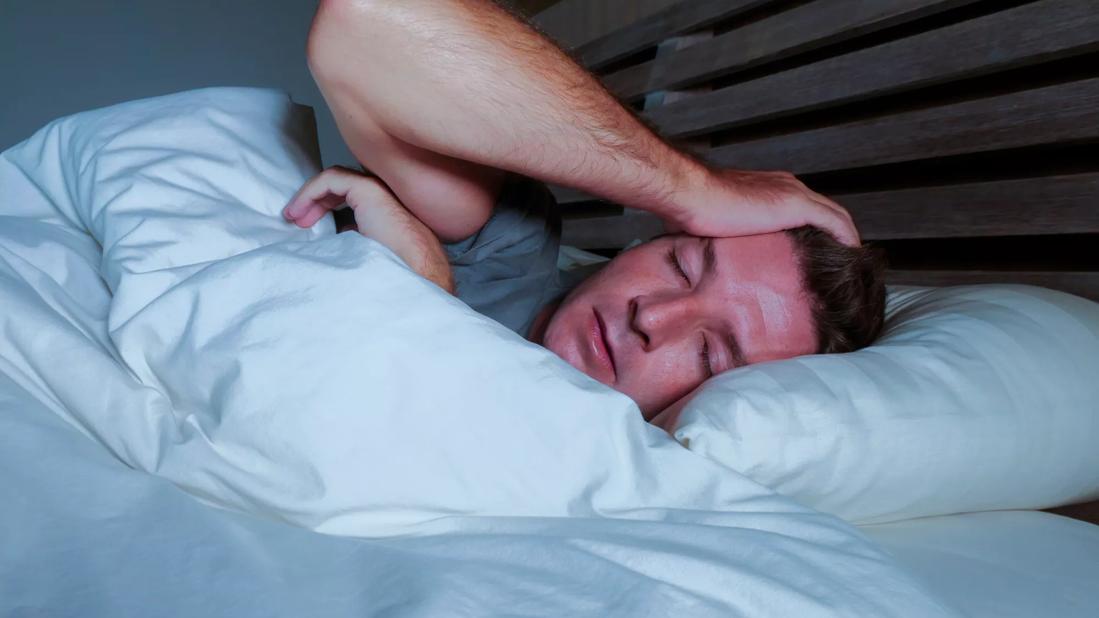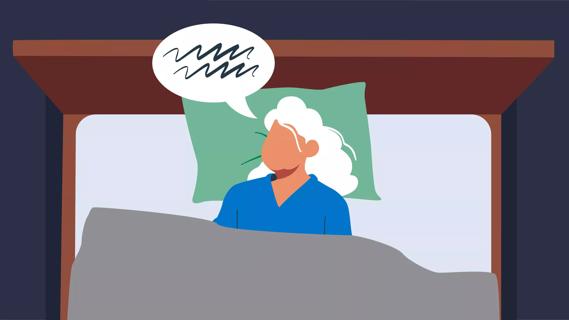Advertisement
The rare sleep disorder may cause violent behaviors during slumber

“I had the weirdest dream last night!”
Advertisement
Cleveland Clinic is a non-profit academic medical center. Advertising on our site helps support our mission. We do not endorse non-Cleveland Clinic products or services. Policy
Most of us laugh about the strange scenarios we encounter as we dream our way through REM (rapid eye movement) sleep.
But those dreams are no laughing matter for people with REM sleep behavior disorder (RBD) — or their partners.
Sleep specialist and neurologist Marri Horvat, MD, MS, discusses what RBD is, how it can impact your sleep and how it’s treated.
Normally, our bodies are paralyzed during REM sleep (except for our eye muscles and our diaphragm, which allows us to breathe).
But in RBD, “because a switch in the brainstem or brain is no longer immobilizing you, your muscles are free to carry out the actions in your dreams,” says Dr. Horvat.
So, you act them out, and this can be in intense violent behaviors that are completely out of character. Those symptoms can include:
“You can injure yourselves diving out of bed into a chest of drawers, running into a wall or hitting a window,” says Dr. Horvat. “You can accidentally strike a bed partner — ironically, while trying to protect them from danger in their dream.”
So, how common is RBD? Less than 1% of adults are diagnosed with RBD. It’s mostly observed in men (and people designated male at birth, DMAB) over 50 years of age. But RBD can develop earlier in life — even in children.
“In younger patients, RBD is most frequently observed in association with narcolepsy or in patients on antidepressant medications,” says Dr. Horvat.
You cycle through each stage of sleep every 90 to 120 minutes, says Dr. Horvat. And each time you do, your REM sleep progressively lengthens.
So, RBD typically happens during the last half of the night, while sleepwalking and night terrors tend to occur during the first third of the night, as these don’t happen in REM sleep.
Safety is paramount if you or your partner have REM sleep disorder.
“The most important thing to consider is modifying your sleep environment,” says Dr. Horvat. “You have to make the bedroom a safe place.”
Options to try include:
“We also want your partner to consider sleeping in another bed or room until your REM sleep disorder is under control,” she adds.
It’s common for RBD to accompany other parasomnias like:
Advertisement
When this happens men and people DMAB and women and people designated female at birth are more equally affected, and typically at younger ages.
Sleepwalking or night terrors may look like RBD, but they’re disorders of arousal that occur outside of REM sleep. Your eyes are usually open, and although you don’t recall it, you’re somewhat aware of your environment.
“That’s why sleepwalkers can negotiate a path through the bedroom, leave the house or even drive a car,” explains Dr. Horvat. “In REM sleep disorder, you don’t have awareness of your environment and you can’t make it too far from the bed.”
Seizures, sleep apnea (episodes of breathing pauses that can partially awaken you during dreams) sleep terrors and post-traumatic stress disorder can also mimic RBD.
In addition, RBD is linked to developing neurodegenerative disorders, most commonly Parkinson’s disease, Lewy body dementia and multiple system atrophy.
Studies indicate that people with RBD have a greater than 80% likelihood of developing one of these neurodegenerative diseases within 10 to 12 years of developing RBD.
Researchers are working hard to develop early diagnostic tests and drugs that might protect the brain.
“If researchers can identify a drug that’s neuroprotective, we may be able to slow, arrest or prevent further deterioration,” notes Dr. Horvat.
The best way to diagnose RBD is with clinical history and a sleep study.
“A prior study geared to diagnose sleep-disordered breathing like obstructive sleep apnea can miss the diagnosis; you need one specifically for RBD,” according to Dr. Horvat.
Sleep studies allow experts to observe whether your muscles are paralyzed during REM sleep. They look for increased muscle tone while a person is in REM sleep.
Medications can help with the symptoms of RBD but can’t cure it.
“Medications can improve how often these events occur, or even quiet disruptive screaming and allow partners to sleep in the same bed safely, which is a wonderful thing,” says Dr. Horvat.
The safest and easiest medicine to tolerate is melatonin. However, high dosages of melatonin are often needed for effective treatment. The other commonly used medicine is clonazepam, a benzodiazepine also used to treat anxiety and seizures.
“Clonazepam is very effective in controlling symptoms, but many patients can’t tolerate its side effects,” says Dr. Horvat. These include:
In addition, says Dr. Horvat, some other medications seem to provoke or unmask RBD. Certain antidepressants like venlafaxine (Effexor®) may cause you to start acting out. In those cases, your doctor may want to switch to an option that doesn’t aggravate RBD like bupropion (Wellbutrin®).
But many people who act out their dreams don’t tell their doctors, says Dr. Horvat.
“Maybe you feel embarrassed, but you have to share this with your physician,” she stresses. “We can work on ways to keep you and your partner safe — and in the same bed.”
Advertisement
Learn more about our editorial process.
Advertisement

A morning routine called RISE-UP may cut down the time you spend groggy and disoriented after waking up

Sleeping with separate blankets can help you get the ZZZs you need — without fighting for covers all night

Stress, weight gain and forgetfulness are just a few effects of losing sleep

Stress, alcohol, sleep apnea and (you guessed it!) scary movies are a few common causes of bad dreams

Regular exercise, an iron-rich diet, adequate sleep and bedtime routines that include a warm bath or massage may help with your kid’s RLS

Recording your dreams may help you become more mindful, understand your thought patterns, process your emotions and even reduce your stress

Chamomile, lavender and valerian root teas may offer a faster route to dreamland

Many factors can contribute to sleep talking, like stress or anxiety, lack of or low-quality sleep, or even more serious sleep-related conditions

Focus on your body’s metabolic set point by eating healthy foods, making exercise a part of your routine and reducing stress

PFAS chemicals may make life easier — but they aren’t always so easy on the human body

While there’s little risk in trying this hair care treatment, there isn’t much science to back up the claims